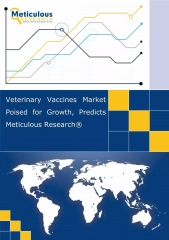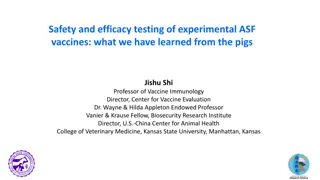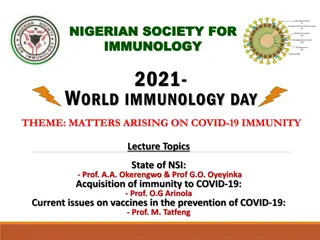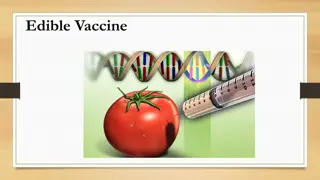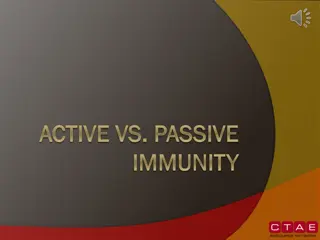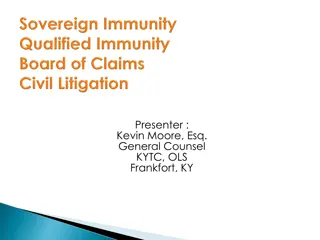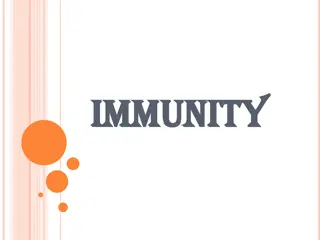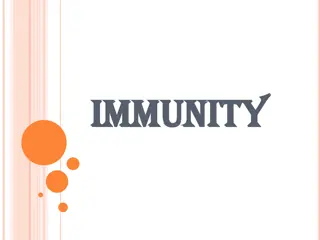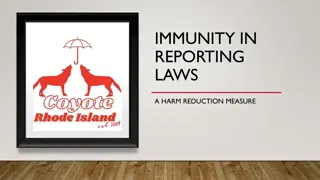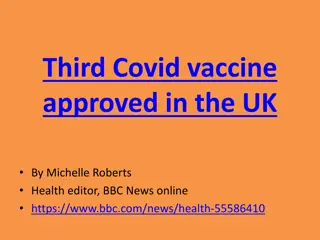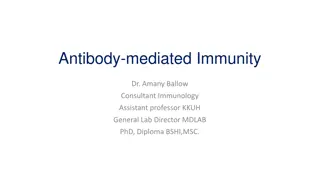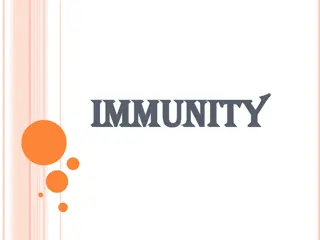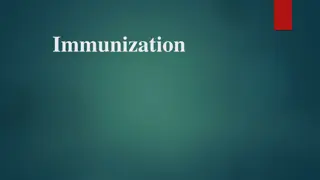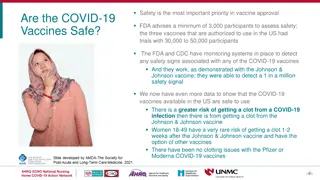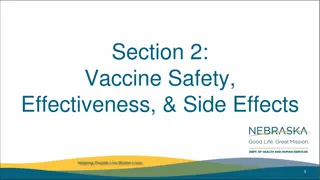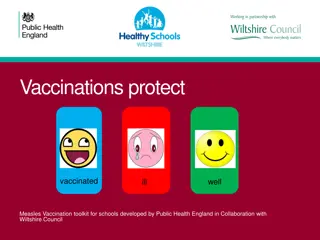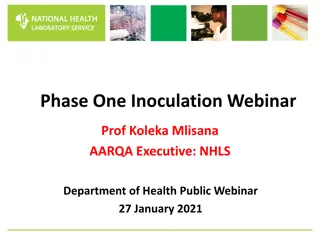Understanding Covid-19 Vaccines and Herd Immunity
Scientists, doctors, and nurses continue to learn more about the coronavirus daily, leading to evolving facts and advice on prevention and treatment. Vaccination helps prevent severe illness from Covid-19, as highlighted by hospitalization and mortality statistics. Long Covid can cause lingering symptoms even after recovery. While herd immunity sounds promising, challenges exist in achieving it, including uncertainties about vaccine transmission prevention.
Download Presentation

Please find below an Image/Link to download the presentation.
The content on the website is provided AS IS for your information and personal use only. It may not be sold, licensed, or shared on other websites without obtaining consent from the author. Download presentation by click this link. If you encounter any issues during the download, it is possible that the publisher has removed the file from their server.
E N D
Presentation Transcript
Coronavirus vaccine Coronavirus vaccine 2021-02-15 Disclaimer: As scientists, doctors and nurses understand more about SARS-CoV-2 (the 2019 coronavirus) every day, the facts and advice on prevention and treatment may change. It can take a while before these slides can be updated. If in doubt, please check with your GP surgery.
Why vaccinate? (1) Why vaccinate? (1) If you catch the coronavirus, vaccine prevents you from becoming seriously ill from Covid-19 disease UK Gov data reports 423,269 people had required hospital treatment for Covid-19. 112,465 have died. These make up 45.7% of all deaths due to different causes. Last week, 29,326 people were in hospital and 3,505 on ventilation (machine assisted breathing) Younger people are not spared. Those aged 18 to 64 account for 35.4% of hospital admissions, compared to 21.8% for age 85 and over.
Why vaccinate? (2) Why vaccinate? (2) Current survey shows 1 in 65 people are infected with Coronavirus. The CDC (Centre for Infectious Diseases) has expanded the list of recognised symptoms: Fever or chills New loss of taste or smell Cough Shortness of breath Sore throat Congestion or runny nose Fatigue Nausea or vomiting Muscle or body aches Headaches Diarrhoea other possible symptoms
Why vaccinate? (3) Why vaccinate? (3) Among people who survived Covid-19 disease, doctors are seeing many of them continue to suffer from after effects Long Covid can follow both mild and severe illness They may have extreme tiredness (fatigue), problems with memory and concentration ("brain fog"), difficulty sleeping (insomnia), depression and anxiety, pins and needles, joint pain, shortness of breath, chest pain or tightness, heart palpitations, dizziness, tinnitus, earaches, feeling sick, diarrhoea, stomach aches, loss of appetite, a high temperature, cough, headaches, sore throat, changes to sense of smell or taste and rashes
Can I rely on herd immunity instead? Can I rely on herd immunity instead? In theory, if most people ( the herd ) get vaccinated, they will not catch the disease. Then, even if you were not immune, they cannot infect you. There are two problems. The first is, quite a few people are thinking this way. In the end, we end up not vaccinating enough people to achieve herd immunity. The second problem is, scientists do not know whether the vaccine can stop people passing on the virus to you, even if they do not become ill themselves.
How do vaccines work? How do vaccines work? Our body fights infection with our immune system. After an illness due to a bacteria or virus, the immune system learns about it and produces antibodies to neutralise it next time Vaccines are harmless bits of the bacteria or virus, that teaches our immune system to create antibodies, without becoming ill first. These are dormant but the body is prepared to fight a real infection Some vaccines are given in repeated doses, because the second or third dose will wake up the immune system to produce higher levels of antibodies
What are the different vaccines? (1) What are the different vaccines? (1) Inactivated vaccines contain killed virus that teaches our immune system but does not cause disease. Many traditional vaccines are made this way, for example the flu jab. Two coronavirus vaccines developed in China, CoronaVac by Sinovac and BBIBP-CorV by Sinopharm, belong to this type. Bharat Biotech in India has also produced Covaxin using this method. Attenuated vaccines contain weakened virus that does not cause a full-blown illness, but alerts our immune system to respond like in a real infection. A common example is the polio vaccine. Codagenix and Serum Institute of India are working on one that can be given as a nasal spray.
What are the different vaccines? (2) What are the different vaccines? (2) Protein vaccines contain fragments of proteins from the virus, that our immune system can learn to recognise and fight back if we meet the real virus. The Hepatitis B vaccine, in use for 40 years, is based on this method. NVX-Cov2373 from Novavax has been trialled against both UK and South African variants of coronavirus. GSK with Sanofi are trying to improve their version of protein vaccine.
What are the different vaccines? (3) What are the different vaccines? (3) Virus vector vaccines take the genetic code for the spike protein of the coronavirus, and insert it inside a harmless virus (an adenovirus that usually causes a cold). Our immune system does not act against this virus. Instead, our body makes the virus bits that our immune system will fight against! The genetic code starts to produce the spike protein. Our immune system then learns to fight against the spike protein of coronavirus. This technology was used to create a vaccine against Ebola. Vaccines of this category already in use include the ChAdOx1 nCoV-19 vaccine from Oxford /AstraZeneca, Covishield of Serum Institute in India, and Sputnik V from Gamaleya Institute in Russia.
What are the different vaccines? (4) What are the different vaccines? (4) Nucleic acid vaccines also contain genetic code that makes a protein of the coronavirus. Just like virus vector vaccines, our body actually makes the virus bits that we will fight against. However, the genetic code is fragile, so it is wrapped in fatty nano particles, and kept deep frozen. When inside our body, the genetic code (mRNA) manufactures virus protein, and our immune system learns to fight against this protein. Neither the genetic code or the protein can cause Covid illness. Both the BNT162b2 made by Pfizer/ BioNTech, and mRNA-1273 from Moderna have applied this technology.
What are the different vaccines? (5) What are the different vaccines? (5) At present, three vaccines have been approved for use in the UK: Pfizer BioNTech ( 15 per dose) Oxford Astra Zeneca ( 3 per dose) Moderna ( 28 per dose) All three have completed Phase III trials with a wide population Pfizer in USA, Turkey, South Africa, Germany, Brazil, and Argentina (43,448 people) Oxford in UK, South Africa, and Brazil (23,848 people) Moderna in USA (30,420 people)
What are the different vaccines? (6) What are the different vaccines? (6) Variety of people who took part in trials Pfizer Oxford Moderna Gender Male 50.6% 39.3% 52.7% Female 49.4% 60.7% 47.3% Age Younger 57.7% (16-55 years) 87.6% (16-55 years) 75.3% (16-64 years) Older 42.3% (over 55) 12.4% (over 55) 24.8% (65 and over) Ethnic group White 82.9% 82.1% 79.2% Black/ African 9.3% 4.4% 10.2% Asian 4.3% 4.6% 4.6% Natives (American) 0.7% n/a 1.0% Multi-race 2.3% 8.2% 2.1% Not known/ other 0.6% 0.7% 3.0% Medical condition One or more 21% 24.7% 27.1%
What may happen after I have the vaccine? (1) What may happen after I have the vaccine? (1) After vaccination you may experience side effects that are short lived. Pfizer-BioNTech OxfordAstraZeneca Moderna Arm pain 71% 67% 87% Chills 14% 56% 9% Fever 3.7% 18% 0.9% Joint pains 11% 31% 16% Muscle aches 21% 60% 23% Fatigue 47% 70% 38% Headache 42% 68% 24% (from the Lancet and New England Journal of Medicine)
What may happen after I have the vaccine? (2) What may happen after I have the vaccine? (2) Someone said the vaccine could affect my ability to have children? Actually, no. That theory was based on misunderstanding. In pregnancy, the placenta develops using a protein called syncytin-1. It so happens the spike protein on the coronavirus is partly similar to syncytin-1. People wondered if a vaccine against the virus protein might also act against the placenta protein. But in fact only a small part of the spike protein matches the placenta protein. Dr J Foster (Minnesota University) said it is like two people who have phone numbers both containing the digit 7 . Moreover, in the Pfizer vaccine trials, women were allowed to take part only after a negative pregnant test. During the trial, 12 women who had the real vaccine became pregnant, compared to 11 women who had placebo.
What may happen after I have the vaccine? (3) What may happen after I have the vaccine? (3) After the first dose, it takes 2-3 weeks before your immune system produces antibodies. During this time, you can still become ill with coronavirus After the 3 weeks, the first dose gives protection to 52% of people (Pfizer) 64% of people (Oxford) 80% of people (Moderna) You will receive the second dose within 12 weeks. Protection rises to 95% (Pfizer and Moderna) 70% (Oxford)
Who can get the vaccine? Who can get the vaccine? Adults are divided into groups by age and health status. The following groups can have their turn now* (if registered with a GP practice in Haringey): Anyone aged 65 and above Those aged 40 to 64 with a long term health condition that increases their risk (for example asthma, diabetes, heart disease) People of any age with learning difficulties Carers may need to show proof such as employment contract, or have carer code in GP electronic records (age is irrelevant) Frontline health and social care workers *week of 15 February 2021
Who Who cannot get the vaccine? get the vaccine? Children the vaccine has not yet been tested among children, so will not be offered to them. The Oxford team is working on a vaccine for 5 to 12 year olds. Pregnant women there is no evidence that the vaccine is unsafe in pregnancy. On the other hand, we have no proof that it is safe either. So it is recommended only for pregnant women at high risk from a medical condition or their place of work. Allergy to components of the vaccine especially polyethylene glycol (PEG), often added to medicines (such as laxatives), cosmetics, wood preservatives and surfactants.
How do I get the vaccine? (1) How do I get the vaccine? (1) The NHS website advises Your GP can book you into the Lordship Lane or Bounds Green sites* *for people registered with a Haringey GP You can also book yourself into the Hornsey Central site directly* Two pharmacies in Harringay and Oakwood can also do the vaccine Please do not try to go before you are due you will be sent home
How do I get the vaccine? (2) How do I get the vaccine? (2) Housebound patients can be referred to a special team, who will arrange plans to give the vaccine NHS vaccination centres cannot offer you a choice of vaccine. What they give on any day depends on the deliveries they receive. Remember, these vaccines need special refrigeration Please do not turn up without an appointment, you will be sent away Please do not go for the second dose early, you will be sent away All the vaccines are given free of charge to those eligible. Please be aware of scams by text message and email
Further information https://assets.publishing.service. gov.uk/government/uploads/syst em/uploads/attachment_data/fil e/951753/PHE_COVID- 19_vaccination_guide_for_older _adults_English_v2.pdf


